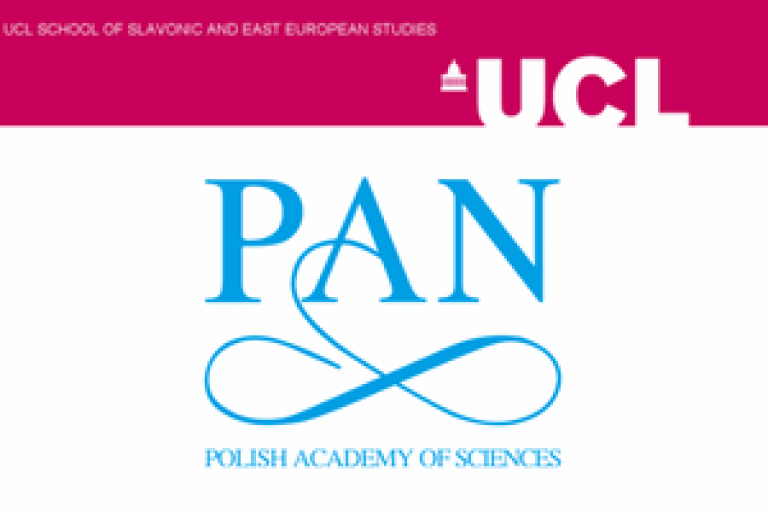Event for Researchers : Meeting with the Polish Academy of Sciences
27 March 2017, 6:00 pm–9:00 pm

Event Information
Location
-
UCL SSEES
Event for Researchers : Meeting with the Polish Academy of Sciences
Polish Academy of Sciences (PAS) invites researchers to attend an event presenting funding opportunities available for individual scientists willing to carry out their research at the PAS. The event will take place at the School of Slavonic and Eastern European Studies on 27th March 2017 at 6pm.
Directions here.
Please email g.mourgaud@ucl.ac.uk to book your space, specifying your area of interest.
The event will comprise opening remarks from PAS representatives, a presentation of the offer session and opportunities for informal discussion over drinks and snacks. During the meeting you will have a chance to know more about the offer of PAS Institutes in the scientific domains of:
- Neuroscience
- Astronomy
- Environment
- Social sciences
- eResearch
What do we offer?
PAS welcomes scientists willing to undertake their research in Poland. The Academy is expanding and has undertaken several actions that are aimed at increasing its international presence and thus further the advancement of Polish science. PAS is internationally active and offers opportunities for foreign researchers in the following areas:
- Polish Institute of Advanced Studies (PIASt)
PAS has recently established Polish Institute of Advanced Studies (PIASt). The Institute aims to promote scientific and intellectual exchange in an international and interdisciplinary community of researchers. The Institute welcomes outstanding researchers in the fields of social sciences and humanities and offers scholarship for the period of one academic year. Scholarship holders will be exempt from administrative and teaching responsibilities to be able to conduct their research projects. Interdisciplinary projects are welcome.
- European research projects under Horizon 2020
Institutes of the Polish Academy of Sciences are part of international consortia under EU Framework Programmes for Research and Innovation and are open to further collaborations with international partners under Horizon 2020.
The Academy regularly hosts European Research Council grants. The Academy welcomes all researchers to consider PAS as a host institution or to collaborate with PAS in the framework of ERC Synergy Grants. Excellence in Science Department of PAS can assist you in all matters regarding ERC.
- International research cooperation of PAS research units
Apart from being active participants of the collaboration resulting from the PAS international cooperation agreements, the PAS research units establish their own cooperation with foreign partners. The units collaborate with more than 1,500 different foreign partners, pursuing more than a thousand joint research projects.
- Bilateral research cooperation agreements
Each year, around 1,000 Polish scholars from the PAS research units travel abroad under bilateral research cooperation agreements. A similar number of foreign scholars come to pursue their research at Polish institutes and universities.
- Research partnership under the framework of international organisations
Research collaboration also takes place under the agreements with nearly 100 international organizations, including the International Council for Science (ICSU), the European Academies’ Science Advisory Council (EASAC), and the Inter-Academy Panel: the Global Network of Science Academies (IAP)
- Cooperation with academies of science
The Polish Academy of Sciences is proud to collaborate with more than 70 foreign academies of science, including British Academy, and equivalent organizations from Europe, Asia, North America, and Africa.
- University of The Polish Academy of Sciences
In the near future the PAS will launch University of the Polish Academy Sciences that will concentrate on postgraduate studies. The University will have an ambition to become an important research hub at national and international level. Collaboration with top international researchers will be crucial for the success of this initiative.
About the Academy
Polish Academy of Sciences is a state scientific institution that since its foundation in 1952 has worked comprehensively to strengthen national research capacity and foster the pursuit of scientific excellence. To achieve this the Academy has acted through an elected corporation of top academics, including both national and foreign members, becoming a major scientific advisory body.
The Academy is structured into a set of five Divisions, Territorial Branches, scientific and task-force committees, a Young Academy, a Science Ethics Committee, and an Audit Committee. The basic scientific unit of the Academy is the research institute, 69 of which are currently in operation. Most of them rank as leading institutions in their scientific or R&D activity. PAS institutes also form part of consortia and centers set up to carry out concrete research projects.
Selected achievements:
A team from the Space Mechatronics and Robotics Laboratory at the PAS Space Research Center (the strongest center in the world making specialist devices of this sort) constructed the MUPUS penetrator, an instrument equipped with a hammering device and a 40 cm rod carrying measuring devices. The instrument is part of the European Space Agency’s Rosetta mission, underway since 2004. It penetrated the comet’s surface and is sending measurement data back to Earth.
One of the projects at the International Institute of Molecular and Cell Biology in Warsaw studies the mechanisms of DNA repair, the role of which is to prevent the distortion of genetic information. The DNA molecule, which encodes information about how each cell and the whole organism are built and function, undergoes chemical damage, either spontaneously or under the influence of external factor (radiation, carcinogens etc.). Staff members of the Institute’s Laboratory of Protein Structure use protein crystallography, which allows them to determine the three-dimensional architecture of molecules and further elucidate their mechanism of action. The Laboratory has discovered, for example, the way the UvrA protein detects various DNA lesions and initiates repair. Another achievement involved elucidating the mechanism of the RuvC enzyme, which participates in a repair pathway in which a damaged region of DNA is fixed using a correct copy thereof. The team also determined the first structures of another important DNA repair enzyme – Slx1.
Please email g.mourgaud@ucl.ac.uk to book your space, specifying your area of interest.
 Close
Close

